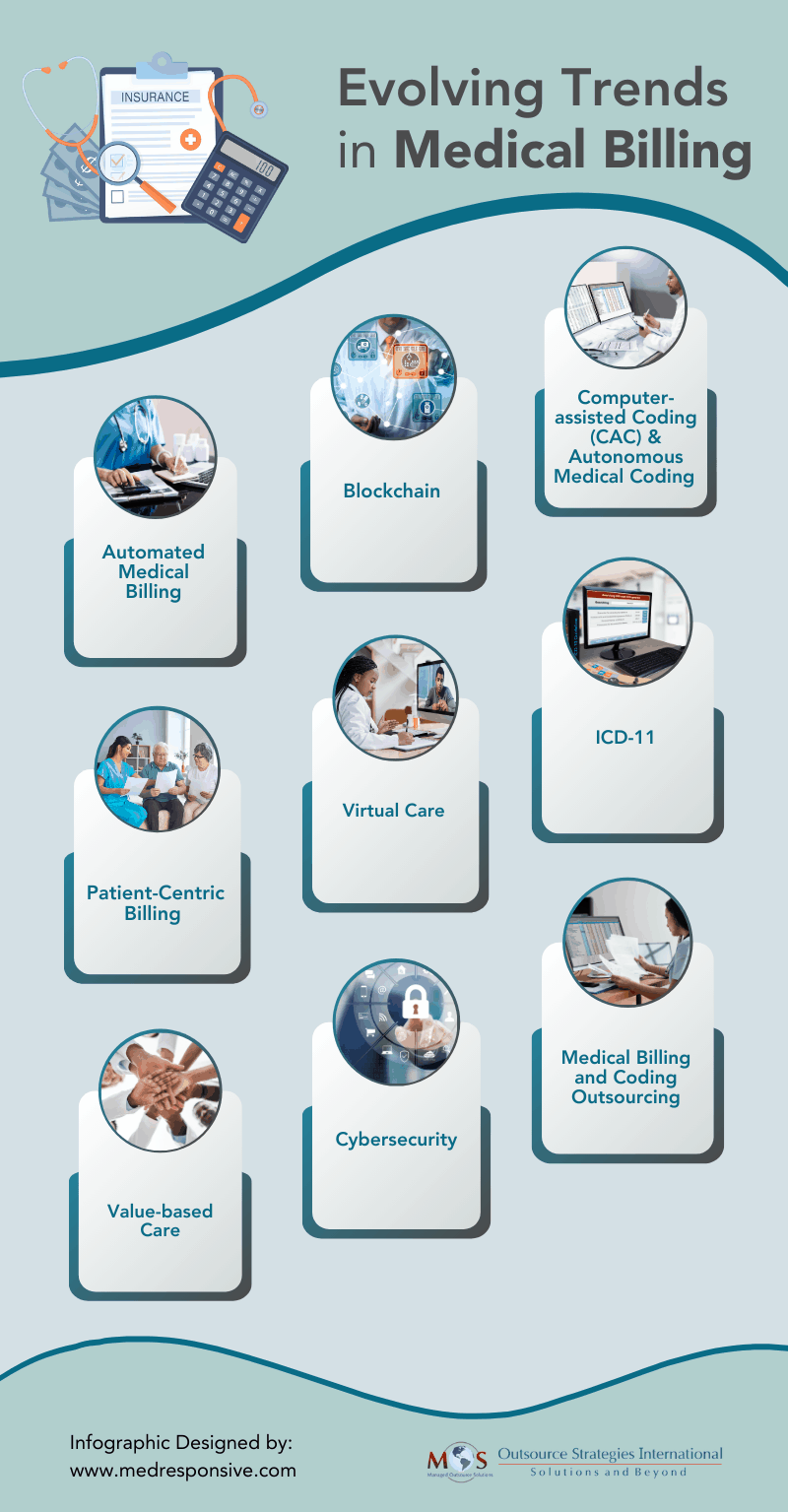Efficient medical billing is critical for your practice’s financial well-being. Regardless of whether you perform billing in-house or outsource it, knowing and understanding the ongoing trends in medical billing is important. This will enable you to pinpoint areas where your practice might fall behind and take proactive measures to enhance revenue generation.
Navigating Future Trends in Healthcare Billing
Awareness of future trends in healthcare billing is vital as it helps stakeholders adapt to the evolving landscape of the industry. Understanding these trends allows healthcare providers, medical billing companies, and organizations to anticipate changes in regulations, technology, and patient expectations. They can proactively strategize and implement innovative billing practices that align with emerging technologies to optimize revenue cycles and improve operational efficiency.


Boost Your Revenue: Stay Ahead in Medical Billing!
Explore the latest trends shaping the future of medical billing.
Call Now (800) 670-2809
Future Trends in Healthcare Billing
Here are some emerging trends for 2024 in medical billing which are transforming the healthcare industry:
Automated Medical Billing
The use of technology and software systems to streamline various billing processes is on the rise. Automation in medical billing involves leveraging tools to handle tasks such as data entry, claim submissions, coding, insurance verification, and even payment posting. Implementing automation can reduce error-prone manual work, enhance efficiency, and accelerate the billing cycle. Software systems can detect potential inaccuracies or missing details in claims, and ensure compliance with regulations, enabling faster claim resolution and minimizing issues that can lead to claim denials or delayed payments. With less administrative hassles, providers can focus better on patient care.
Computer-assisted Coding (CAC) and Autonomous Medical Coding
CAC blends human expertise with technological aid in medical coding. It uses software and algorithms to analyze clinical documentation and assign CPT, ICD-10, and HCPCS codes. Suggestions for codes are generated based on programmed rules. The human coder then reviews, accepts/rejects, and adds missing codes, ensuring accuracy before claim submission.
Autonomous medical coding, using AI and ML, automates assigning diagnosis and procedure codes by training algorithms to understand medical records. These systems analyze records using NLP and pattern recognition. Autonomous medical coding frees up the coder’s time to focus on more complex coding scenarios that require human intelligence and problem solving. Nevertheless, though computers and AI speed up and enhance coding accuracy, human checks are crucial for accuracy and quality.
Patient-Centric Billing
As patient financial responsibilities increase, it’s more crucial than ever to prioritize how patients receive and manage their bills, ensuring a positive billing experience and ease of payment. The patient-centric revenue cycle takes account of the patient’s experience throughout the billing process. It aims to ensure that patients understand their medical costs, including transparent and timely communication about the balance due and payment options. As healthcare continues to evolve, patient-centric billing approaches will play a pivotal role in shaping positive patient experiences, promoting financial well-being, increasing patient satisfaction and fostering stronger connections between patients and healthcare providers.

Want more content like this?
Read our post on the Patient-Centric Approaches in Modern Medical Billing
Blockchain
Blockchain, a secure technology, generates trustworthy data records shareable across networked databases. Blockchain’s emergence as a medical billing trend arises from its ability to revolutionize data security and transparency. By employing its decentralized and immutable ledger system, blockchain in medical billing ensures the integrity and privacy of sensitive healthcare information, streamlines claim processing, reduces fraud, and enhances trust among stakeholders. Its potential lies in securely managing medical billing and claims information while simplifying complex transactions across the healthcare ecosystem.
Value-based Care
The federal government created value-based care programs with the aim to cut healthcare costs and improve patient outcomes. Value-based care prioritizes quality over quantity in reimbursement criteria, and is emerging as a potential substitute for fee-for-service payment models. Fee-for-service pays based on quantity of services rendered such as number of visits, tests performed, and prescriptions administered. On the other hand, value-based care links payment to care quality, emphasizing efficiency.
In addition to Medicare and Medicaid, commercial payers are offering value-based arrangements. Each arrangement has its own reporting rules and its own quality metrics, and must utilize compatible software and codes. Value-based care billing requires robust data tracking and reporting systems to measure and demonstrate improvements in patient health and outcomes. Providers need to report metrics, tracking hospital readmissions, adverse events, population health, and patient engagement. They receive incentives or bonuses for meeting or exceeding certain benchmarks related to patient health improvements, reduced hospital readmissions, better chronic disease management, or overall cost savings. Patients can expect to see cost-effective, higher quality care as value-based payment systems become the norm.
Virtual Care
As Deloitte puts it, virtual health is a reality of the present. Combining digital and telecommunication technologies, telemedicine bridges the gap between patients, physicians, and other caregivers. It allows providers to coordinate patient care in a more efficient manner. Virtual health services could provide a significant return on investment as the health care sector moves from the fee-for-service model to value-based care and compensation. However, billing a virtual patient visit is not the same as billing an in-person visit and rules for billing telemedicine can vary among government and private third-party payers. To ensure proper reimbursement for virtual medical care, medical billers need to know: which codes and modifiers are applicable, the telemedicine guidelines for each payer, and whether the patient’s insurance covers telemedicine.
Cybersecurity
Cybersecurity risks in healthcare relate to threats to patient data and the potential hacking of medical devices. Patient records contain a wealth of personal information and are vulnerable to identity theft, data theft, and fraudulent medical billing by cyber criminals.
Medical billing companies have access to patient records and handle protected health information for claims processing. With a general upward trend in the number of patient record breaches each year, medical billing service providers must have robust cybersecurity measures in place to safeguard patient and ensure continuity of care. Ensuring compliance with HIPAA in medical billing as well as meeting other relevant regulations is imperative to maintain the security and privacy of patient data.
ICD-11
ICD-11 became available globally as of January 1, 2022 as the universal standard for disease classification. ICD-11 has several new chapters and will have an impact on coding for all specialties. ICD-11 introduces many specific diagnoses that were previously left out, enabling more precise and detailed data collection. Beyond its predecessor, ICD-11 boasts enhanced comprehensiveness and introduces new classes of codes (such as Diseases of the Immune System) new categories like ‘digital health’ (eHealth), ‘cancer survivorship,’ and ‘lifestyle choices’, and more than 5500 rare diseases. It also has the potential to support automated or artificial-intelligence–assisted coding. Though it is it is still unknown when ICD-11 will be ready for implementation in the United States, healthcare providers and medical billing companies have started familiarizing their coding and clinical documentation staff with ICD-11 concepts to prepare for implementation.
Medical Billing and Coding Outsourcing
Outsourcing medical billing and coding is a growing trend. According to Market Research Future, the global medical billing market, which was valued at USD 14.2 billion in 2022, is expected to grow from USD 15.88 billon in 2023 to USD 31.19 b by 2030, expanding at a CAGR of 11.9% during the forecast period 2023-2030. The report notes that the growing focus on compliance and risk management, increasing need to improve medical billing efficiency, and efforts to reduce in-house operational costs are the key drivers of the demand for outsourced medical billing services.
Managing the many steps of the medical billing process – from patient scheduling and enrolment to insurance eligibility verification, coding and submission of claims to payers, and claims follow-up and payment collection-requires expertise. In-house medical billing requires practices to hire staff to handle all of these revenue cycle aspects, which can increase operational costs. Outsourced medical billing involves a service provider managing these functions, typically compensated through a percentage of the practice’s collections. Outsourcing is much more cost-effective due to reduced overhead costs associated with staffing, technology, and ongoing training. Additionally, it ensures specialized billing expertise and flexible support from experienced service providers.


Revolutionize Your Billing Process: Discover What’s Next!
Elevate your billing efficiency and maximize revenue potential
To conclude, many new trends and technologies are revolutionizing and reshaping the medical billing landscape. As a healthcare provider, you need to understand and potentially adapt to these changes to stay in the game and ensure accurate claim submission and reimbursement.
However, while automation has improved billing processes significantly, billing experts offer valuable expertise in handling complex claims, navigating regulatory changes, addressing unique scenarios, negotiating with insurers, and maximizing revenue. Healthcare providers outsource insurance verification processes to a medical billing company so they can let the patient know their full responsibility prior to their appointment. Also, while the EMR/EHR automate the claims, it is necessary to have them reviewed by billing experts before they are sent out. The automation is always missing critical things like modifiers that can be used to get the claim paid.
The knowledge and experience of billing experts provide an advantage over relying solely on automation systems for billing tasks.





